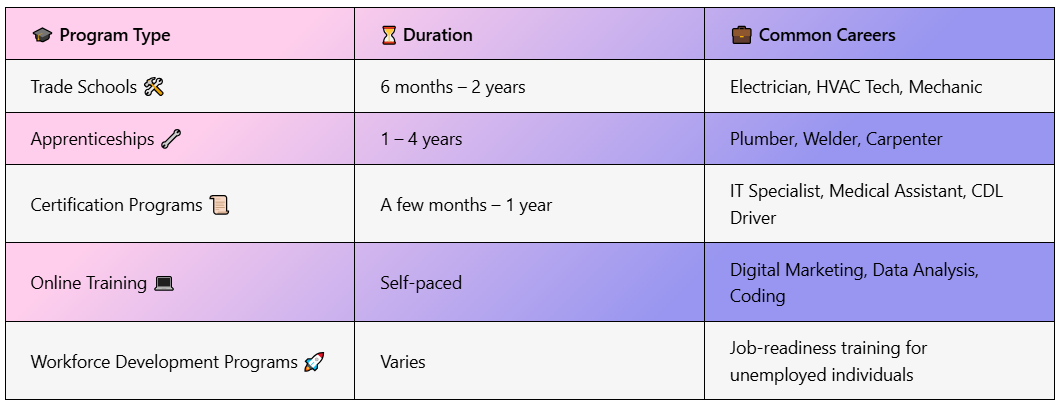Understanding Career Training and Its Importance
Understanding career training is essential for anyone looking to enhance their employability. This type of training equips individuals with the specific skills and knowledge required in various fields, making them more attractive to potential employers. For instance, someone pursuing a career in early childhood education can benefit immensely from specialized training programs that cover child development, teaching strategies, and classroom management.
These programs not only provide theoretical knowledge but also practical experience, which is invaluable in the job market. One of the key advantages of career training is its ability to bridge the gap between education and employment. Many vocational high schools offer tailored programs that prepare students for specific careers, ensuring they graduate with relevant skills. This targeted approach means that students are not just learning for the sake of learning; they are acquiring competencies that employers are actively seeking. Here are some benefits of career training:
- Skill Development: Gain hands-on experience and technical skills that are directly applicable to the job.
- Networking Opportunities: Connect with industry professionals and peers who can help you in your job search.
- Increased Confidence: Build self-assurance through practical training and real-world applications.
- Higher Employability: Stand out in a competitive job market with specialized training and certifications.
Contact Now to Pursue Your Dream Degree From Your Nearest College
How Career Training Enhances Your Skill Set
Landing your dream job requires the right skills, and career training is essential in enhancing your skill set. Whether you’re pursuing early childhood education or attending a vocational high school, specialized training provides the knowledge and practical experience necessary to excel. This focused approach not only boosts your confidence but also shows your commitment to professional growth. Here are some key benefits of career training that can help you get hired:
- Practical Experience: Many programs offer hands-on training, allowing you to apply your knowledge in real-world settings. For example, early childhood education programs often include internships in local schools, providing valuable classroom experience.
- Industry-Relevant Skills: Career training emphasizes the skills that employers seek, ensuring you learn the latest techniques and technologies relevant to your field, making you a competitive candidate.
- Networking Opportunities: Training programs connect you with industry professionals and peers, expanding your professional network, which can lead to job opportunities and mentorship.
- Certification and Credentials: Completing a career training program often results in certifications that enhance your resume, demonstrating your initiative to further your education and skills.
In summary, career training is an investment in your future. By enhancing your skill set through focused education and practical experience, you position yourself as a strong candidate in the job market.
The Role of Career Training in Job Market Competitiveness
In today’s competitive job market, having the right qualifications is essential. Career training is vital for equipping individuals with the skills and knowledge needed to stand out among candidates. Whether you are entering the workforce for the first time or switching careers, programs in fields like Early Childhood Education or vocational training at the high school level provide a solid foundation.
These programs enhance your resume and boost your confidence for interviews and job applications. A key benefit of career training is its emphasis on practical skills. Unlike traditional education, which often focuses on theory, career training includes hands-on experience. This is especially true in vocational high schools, where students work on real-world projects relevant to their fields. Here are some advantages of pursuing career training:
- Skill Development: Acquire specific skills that employers seek.
- Networking Opportunities: Connect with industry professionals and potential employers.
- Increased Employability: Differentiate yourself with specialized training that meets job market demands.
Additionally, career training programs often offer job placement assistance, easing the transition from education to employment. Graduates from Early Childhood Education programs, for example, are frequently in high demand as families seek qualified professionals. By investing in career training, you enhance your qualifications and position yourself as a desirable candidate in a crowded job market. The right training can open doors to opportunities you may not have considered.

Identifying the Right Career Training Programs for You
Identifying the right career training programs can significantly impact your job search. In a constantly evolving job market, having the right skills is essential. Career training not only provides you with necessary knowledge but also boosts your employability.
For example, if you are interested in early childhood education, enrolling in a specialized program can offer hands-on experience and a deeper understanding of child development, which employers value highly. To find the right career training, evaluate your interests and career goals. Here are some steps to guide you:
- Assess Your Interests: Reflect on what you enjoy and your passions.
- Research Programs: Seek programs that align with your interests, like vocational high schools offering technical courses.
- Check Accreditation: Ensure the program is accredited and recognized by employers.
- Seek Feedback: Talk to alumni or current students for insights into the program’s effectiveness. Choosing the right career training program offers numerous benefits. You gain valuable skills, build a professional network, and increase your confidence.
Key advantages include:
- Enhanced Job Prospects: Employers prefer candidates with specialized training.
- Practical Experience: Many programs include internships that prepare you for the job market.
- Networking Opportunities: Training programs connect you with industry professionals, opening doors for future employment.
Investing time in finding the right career training sets you up for success.
How Career Training Improves Your Resume and Job Applications
Landing your dream job often hinges on having the right qualifications, and career training is a vital tool in this process. It not only enhances your skills but also significantly improves your resume and job applications. Completing a vocational high school program, for example, sets you apart by showcasing your commitment to your field. This specialized training signals to potential employers that you possess practical skills and knowledge relevant to the job, making you a more appealing candidate.
Career training programs frequently include hands-on experience, which is crucial in today’s competitive job market. If you’re aiming for a career in early childhood education, for instance, participating in a program that offers real classroom experience can provide you with a significant advantage. Employers prefer candidates who demonstrate both theoretical knowledge and practical application. Here are some key benefits of career training that can enhance your job applications:
- Skill Development: Acquire specific skills that are in demand in your industry.
- Networking Opportunities: Build connections with professionals and peers who can assist in your job search.
- Resume Boost: Differentiate yourself with certifications and training that reflect your dedication to your career.
- Confidence Building: Gain the confidence needed to excel in interviews and on the job.
By investing in career training, you are not just enhancing your resume; you are also paving the way for a successful career.
Networking Opportunities Through Career Training
Networking plays a vital role in career training, significantly boosting your chances of employment. Engaging in career training programs, whether in early childhood education or vocational high school, allows you to not only acquire skills but also build essential connections. These programs unite students, instructors, and industry professionals, creating an ideal environment for networking.
Through workshops, seminars, and group projects, you can meet individuals who may assist you in landing your dream job. One major advantage of networking in career training is gaining access to job opportunities that might not be publicly advertised. Employers often prefer candidates who come recommended by trusted sources. Here are some ways networking can benefit you:
- Mentorship: Build relationships with experienced professionals for guidance.
- Job Referrals: Get introduced to potential employers through your network.
- Industry Insights: Learn about trends and demands in your field.
- Peer Support: Connect with fellow trainees who can share job leads or collaborate on projects. Real-world examples illustrate this point.
A culinary arts graduate from a vocational high school might meet a restaurant owner at a training event, leading to an internship or job offer. Similarly, a student in early childhood education could network with local educators and secure a daycare position before completing their training. These connections not only provide job leads but also create a supportive community as you navigate your career.
Contact Now to Pursue Your Dream Degree From Your Nearest College
Real-World Experience Gained from Career Training
Landing a job requires the right qualifications, but real-world experience can truly set you apart. Career training programs, particularly in fields like Early Childhood Education or vocational training in high schools, offer valuable hands-on experience that employers seek. These programs typically include internships, workshops, and practical projects, allowing students to apply their knowledge in real-world settings.
This experience not only boosts confidence but also enhances your resume, making you a more appealing candidate. A significant advantage of career training is the chance to build a professional network. Throughout your training, you will connect with industry professionals, fellow students, and mentors who can offer guidance and job leads. Networking can often uncover job opportunities that are not publicly advertised. Here are some key benefits of gaining real-world experience through career training:
- Hands-on learning: Practice skills in a controlled environment.
- Industry connections: Meet professionals who can assist in your job search.
- Portfolio development: Create tangible evidence of your skills for potential employers.
- Confidence building: Develop the self-assurance needed for interviews and on the job. In summary, career training goes beyond knowledge acquisition; it prepares you for the workforce.
By participating in programs that provide real-world experience, you demonstrate your commitment to your field. Whether in Early Childhood Education or vocational training, the skills and connections gained can significantly boost your employability and help you land your dream job.
Success Stories: How Career Training Led to Employment
Landing a job often hinges on having the right skills, and career training programs are tailored to provide individuals with essential knowledge and hands-on experience. Take Sarah, for example, who enrolled in a vocational high school program in early childhood education.
Her training encompassed both child development theory and practical internships, which helped her stand out in a competitive job market. Here are some key benefits of career training that can lead to successful employment:
- Skill Development: Career training equips you with targeted skills that employers seek, allowing you to tailor your learning to job demands.
- Networking Opportunities: Many programs connect you with industry professionals, leading to job referrals and mentorship.
- Hands-On Experience: Practical training enables you to apply your knowledge in real-world settings, enhancing your appeal to employers.
- Confidence Boost: Completing a career training program can elevate your self-esteem, making you more confident in job interviews. Sarah’s experience is just one example.
Graduates from vocational high schools often find that their specialized training not only prepares them for their first job but also paves the way for career advancement. Investing in career training means building a solid foundation for a successful future.
The Long-Term Benefits of Investing in Career Training
Investing in career training can significantly enhance your employability, whether you are entering the job market for the first time or considering a career change. The right training equips you with essential skills and knowledge to stand out in a competitive landscape. For example, those pursuing a career in early childhood education benefit from specialized programs that teach child development and provide hands-on classroom experience.
This practical training not only boosts confidence but also makes candidates more appealing to employers. A major advantage of career training is the opportunity to build a strong professional network. During your training, you connect with instructors, industry professionals, and peers who can become valuable contacts in your job search. Vocational high schools often collaborate with local businesses, offering internships that can lead to job offers, thus shortening the time to employment after graduation. Here are some long-term benefits of investing in career training:
- Skill Development: Acquire in-demand skills for your field.
- Increased Confidence: Gain self-assurance for job market entry.
- Networking Opportunities: Establish relationships for referrals and mentorship.
- Higher Earning Potential: Well-trained individuals typically earn more.
- Career Advancement: Continuous learning opens doors for promotions.
By prioritizing career training, you are not just preparing for your first job; you are setting the foundation for a successful career.
Contact Now to Pursue Your Dream Degree From Your Nearest College
FAQs
-
What is career training?
Career training refers to specialized education and hands-on experience designed to prepare individuals for specific jobs or industries. -
How does career training differ from a traditional college degree?
Career training focuses on practical skills for a specific job, while college degrees provide broader academic knowledge and theory. -
Who can benefit from career training?
Anyone looking to gain new skills, switch careers, or enter the workforce quickly can benefit from career training programs. -
What types of career training programs are available?
Programs are available in healthcare, technology, skilled trades, business, and many other industries. -
How do I choose the right career training program?
Consider your interests, job demand, program length, cost, and accreditation before choosing a program. -
Are online career training programs effective?
Yes, many reputable institutions offer online career training that provides flexibility and industry-recognized certifications.



